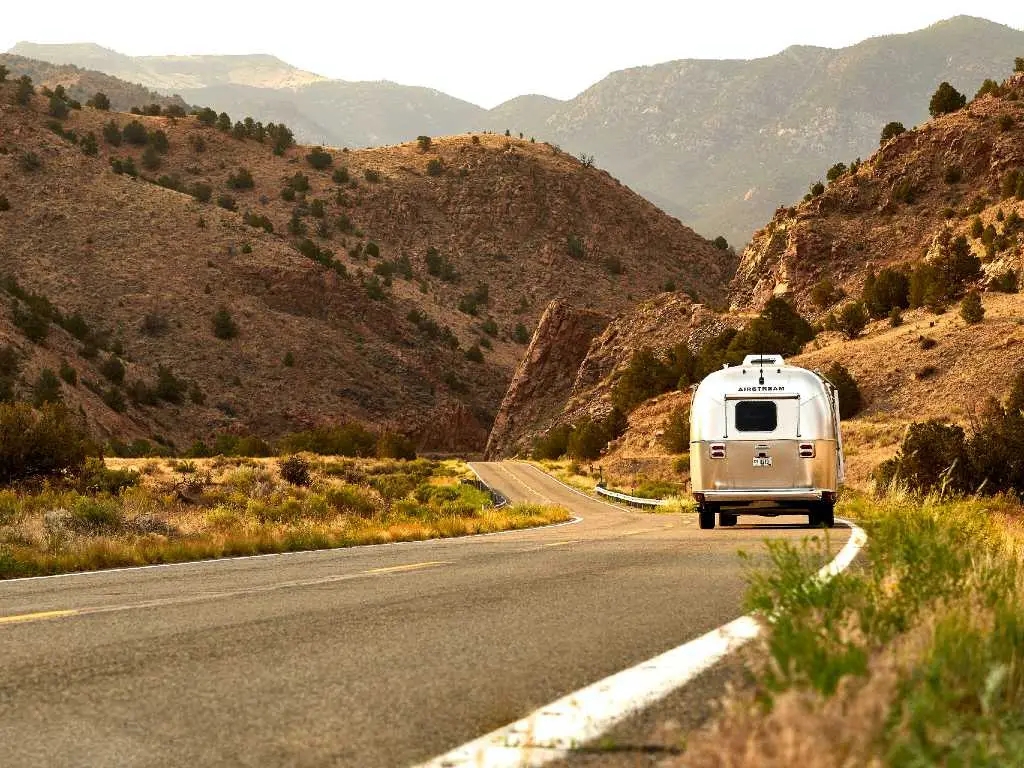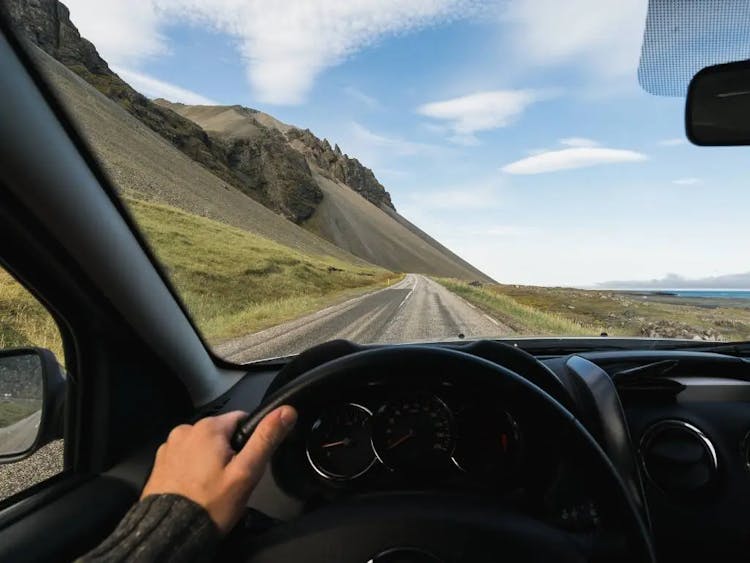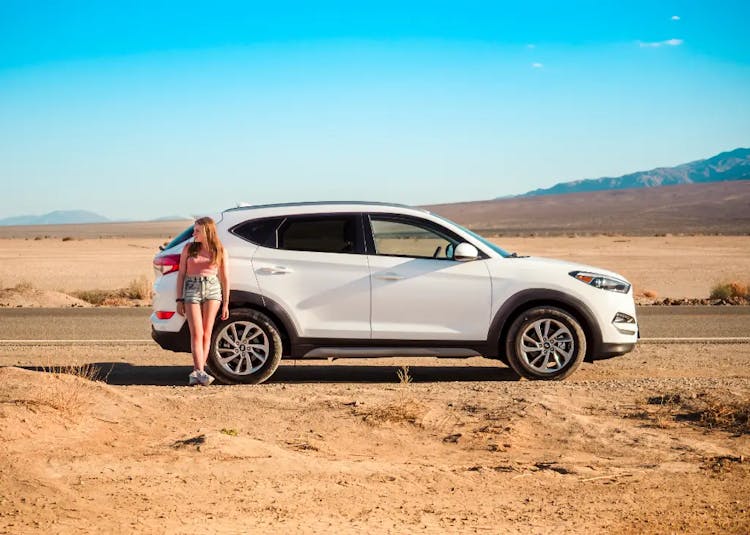
The Complete Guide to Traveling the US by RV
Table of Contents
The past few years have brought many changes to the way we travel as a society, with road trips closer to home all the rage and RV travel becoming an increasingly more popular method to get around, no matter the age group.
In fact, more than nine million US households now own an RV, and the RV Industry Association reports that RV sales were up 31.2% in fall 2020 over the same period the year prior.
Considering traveling by RV for the first time? Whether you’re buying or renting, here are some things you need to know before you hit the road.

Test drive the lifestyle first
RV travel is a convenient way to pack up your home and go—but it isn’t for everyone. Before you sell all your belongings and become a full-time van lifer—or even set out on a multi-week trip with the family—consider renting an RV for a weekend first and hitting up a state park close to your house (you know, just in case).
Companies like Outdoorsy and RVShare have an inventory of campers and standard and compact RVs at locations across the country that allow you to test out various mobile rigs (and the concept itself) before signing up for a longer trip.
| Going members get a discount on their first rental with Outdoorsy. Log in and check out the Membership Perks page to redeem. |
The most basic camping option is a towable pop-out trailer. These compact homes—well-suited for couples and solo travelers without a lot of baggage—expand beyond their size and can often be towed with a car instead of a truck until reaching a camping destination.
The next step up in options is towable but with hard sides that, unless there are extensions, stay in place, even while mobile. These trailers come in two different towing configurations that are dependent on the hook-up you have on your full-size truck: The fifth-wheel attachment is within the bed of the truck while the standard trailer is attached at the hitch.
The last option, a full-on motorhome, ditches the separate vehicle entirely and can also be considered a bus. These are self-contained units and come in an almost infinite array of options, with high-end models costing well over $1 million; they’re perfect for luxury travelers, larger families living on the road together or those who want minimal setup each time they reach a new campsite.
Lengthen your stay
Looking to save on travel? (Let’s be honest—who isn’t?) Eliminating both the cost of flights and hotels, traveling by RV is a smart way to keep costs low and extend your time on the road. For example, the longer you stay in one place, the cheaper your stay will be at many RV parks and campgrounds thanks to heavily discounted weekly or monthly rates.
Before you commit to your length of stay, do a cost comparison of a few days versus a few weeks, and you might find that staying longer works out to roughly the same price; even if you can only stay three weeks, sometimes it’s more economical to just book the month-long rate anyway. Another bonus: Staying put longer means you’ll save money on gas and really get to know your surroundings.
Pack light
Whether you’re looking to hit the road full time, or just plan to be gone a few weeks, you’ll want to slim down your belongings for a couple reasons. First, unlike staying at a hotel, you won’t be unpacking on the other side, meaning everything you carry with you, well, stays with you (and there’s nothing like feeling claustrophobic in your own temporary home on wheels).
Second, you’ll find you need a lot less than you think you do when traveling by RV, and the majority of campgrounds have laundry facilities where you can wash your clothing. You’ll also save money in the long run by your RV not being overweight should you have to check in at weigh stations. Weigh-station rules are state-specific and often only apply to commercial vehicles, so while weighing your rig is not something you’ll likely have to do often—if ever—there is a small chance depending on your rig and where you’re traveling. In some states, any vehicle weighing more than 10,000 pounds in Gross Combined Weight Rating (or GCWR) is required to pull over and be weighed at all weigh stations. The AAA Digest of Motor Laws explains the rules for each state.
Park for free
Don’t want to blow your whole travel budget on RV campgrounds? You don’t have to. Many nationwide entities like Walmart, Cabela’s, and Lowe’s have company-wide policies in place that allow RVs a free place to park in their lots overnight. To be sure and cover all your bases, always call the store manager in advance to check that there aren’t any local ordinances or individual store policies that would prohibit overnight parking.

Embrace boondocking
Once you’re comfortable in an RV, you might just be ready to level-up and try boondocking. Boondocking, or camping in the wilderness sans hookup, allows you to be closer to nature and further from the crowds, and it doesn’t cost a penny.
The downside? You won’t have access to water, electricity or sewer, so you best plan in advance. Boondocking is particularly prominent on Bureau of Land Management land out West, and you can park for free in National Forest dispersed campsites and along many National Forest roads.
One thing to note is that you are responsible for carrying all of your own trash out, meaning you need to be equipped with sealable containers and trash receptacles. Some of the best boondocking spots are remote with little to no cell service, so be prepared; pack an emergency kit with all first aid, navigational and roadside tool needs, and double-check you have enough water and power to get you through the number of days you’ll be off the grid.
Sign up for memberships
Many RV parks give discounts to Good Sam, AAA, or AARP cardholders, and if you’re prioritizing one campground experience, like a KOA, it may be economical to invest in that organization’s membership, too.
Others to consider: The America the Beautiful pass from the US National Park Service, which allows a family—the pass owner and three accompanying adults age 16 and older (kids 15 and below are free)—entrance to all parks for just $80 a year. Harvest Hosts allows you to RV camp at more than 2,000 wineries, breweries, and farms in the US and Canada. If you’re 62 or older, you can take advantage of the Lifetime Senior Pass for $80.
Know before you go
While it can be tempting to learn on the go—and sure, that’s a lot of the beauty of this style of travel—you’ll want to do a test run with your RV or camper out of your own home or at a local campground before hitting the road for real so you can get to know where the electrical, water and sewage hookups are located and how to use each function.
One of the benefits of staying at an RV campground (versus primitive camping or boondocking) is that you’ll be able to connect to your designated spot’s electrical and water hookup, which enables your appliances to siphon from this source of power rather than using your battery or propane; it also allows you to keep reserves of water onboard.
If you’re traveling by RV or mobile home, remember that you’ll be carrying around all your water and waste with you: both grey water (shower and sink) and black (toilet). You’ll want to dump both regularly at any designated spot: every RV campground will have one, and many truck stops, gas stations and nicer rest stops also have spots where you can flush your accumulated waste.
Rules of the road
Still nervous about setting out on your own? Don’t be. RV travel will soon feel like second nature after you’ve been doing it for a spell. Here’s a check list of road rules—and some camping know-how—to keep with you as you’re learning the ropes.
- Always chock your wheels as soon as you arrive at a campground and before you leave your vehicle to explore by foot. Once a trailer is unhooked from a vehicle, it can shift dangerously.
- Balance and level out the camper to ensure a good night’s sleep.
- Always triple-check your hookups, and batten down any open windows or hatches before hitting the open road.
- Stay out of the fast lane unless it’s absolutely necessary to pass a much slower vehicle. Vehicles that are towing trailers are generally illegal to drive in the far left lane.
Looking for inspiration on where to go? Check out our list of the top bucket-list experiences in every US state or read about our favorite US road trips. Then join Going and get cheap flights delivered right to your inbox.
Published July 20, 2023
Last updated March 26, 2024
Treat your travel to cheap flights
Most deals are 40-90% off normal prices with great itineraries from the best airlines. If it's not an amazing deal, we won't send it. Sign up for free to start getting flight alerts.




